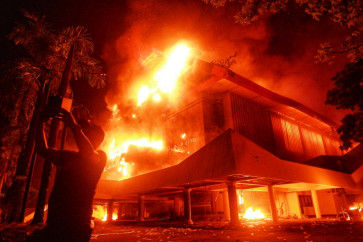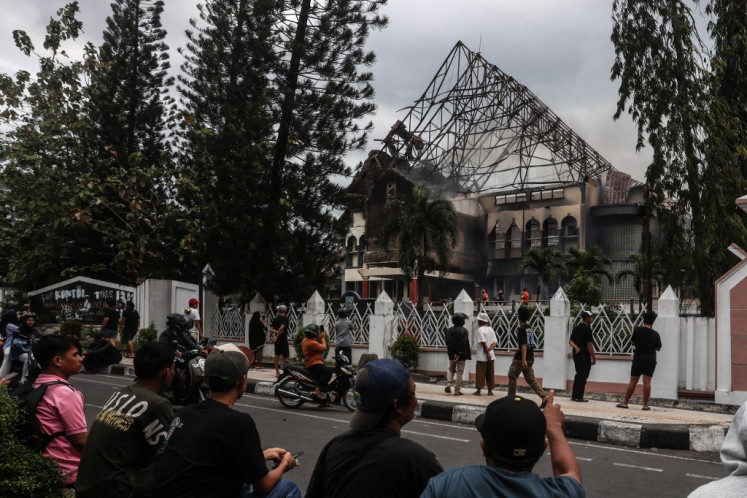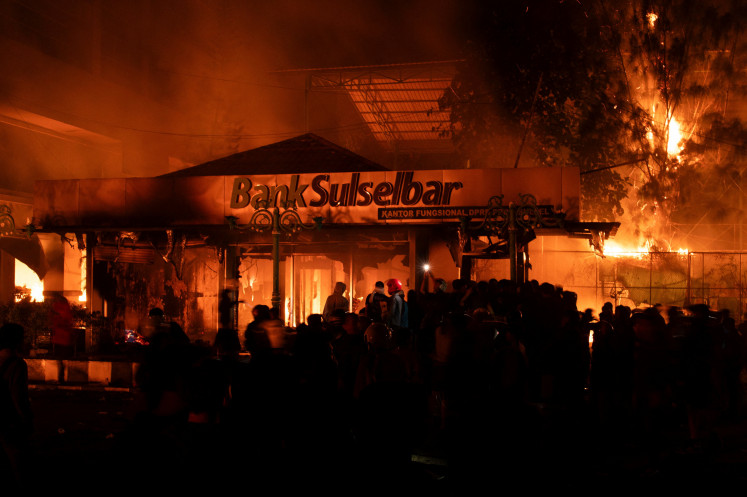Popular Reads
Top Results
Can't find what you're looking for?
View all search resultsPopular Reads
Top Results
Can't find what you're looking for?
View all search resultsMalang turns livestock waste into fuel
Hundreds of biodigesters to produce biogas as an alternative fuel source for communities will be set up by the Malang regency administration this year as part of its efforts to prevent livestock waste from polluting the environment
Change text size
Gift Premium Articles
to Anyone
H
undreds of biodigesters to produce biogas as an alternative fuel source for communities will be set up by the Malang regency administration this year as part of its efforts to prevent livestock waste from polluting the environment.
For the initial stage, the administration has set aside stimulus funds to build 143 biodigesters at a total cost of Rp 500 million *US$53,763* derived from this year's provincial budget.
Head of the regency spatial planning agency, Romdhoni, told The Jakarta Post that the biodigester pilot project aims to help residents to process livestock waste into biogas as an alternative fuel for cooking purposes, replacing kerosene, and to produce urea fertilizer.
"The program basically aims to improve the quality of people's environment as well as providing them with alternative cooking fuel," Romdhoni said.
Malang regency has the largest livestock population in East Java, with more than 130,000 dairy and beef cattle, which produce up to 270 tons of milk daily by 14 village cooperatives units.
The regency is also home to around 140,000 goats of the etawa type, raised for their milk and meat.
"Just imagine how much waste they produce, which would pollute the environment, including springs and rivers, if not managed well," Romdhoni said.
A cow produces around 10 kilograms of solid waste in the form of manure and around 5 liters of urine daily.
If not managed properly, the manure and liquid waste can pollute water sources, as they mostly end up in the river and seep into the ground.
The East Java USAID Environmental Services Program (ESP) recorded earlier that each year, 100,000 children below the age of five - 273 toddlers a day or 11 lives per hour - died of diarrhea across the country. Food and water contamination by the E-coli bacteria, such as from human and animal waste, is one of the causes.
Bintoro, from ESP, said the situation has been exacerbated by a poor public sanitation system as the government has only provided US$840 million for sanitation development purposes in the past 30 years.
"This *low budget* mean that the government only allocates Rp 200 for each citizen annually for sanitation purposes, which is far from the ideal amount of Rp 47,000 per person."
Romdhoni said the biodigesters would be built in 11 districts across the regency, which would each have 13 biodigesters.
"After being built, if community members in an area are interested *in having the project in their neighborhood*, we will provide Rp 700,000 in stimulus funds to build similar biodigesters," he said.
Building a biodigester, he said, was simple - it needed only a plastic equipment to collect gas produced by the biodigester. Each costs around Rp 1.5 million.
Upon completion, the pilot project is expected to attract interest and lead to the formation of small groups near livestock farms.
The groups will later be provided with stimulus funds and they are required to fork out the rest of the needed cash from their own pockets to build the biodigesters.
One of the districts considered successful in implementing the program is Jabung, where 237 biodigesters have been built to hold solid and liquid waste from more than 400 cattle pens.
The East Java ESP has earlier chosen Jabung as a model district in processing waste into biogas and Malang regency as a role model for other regencies in Indonesia.
"Biogas can be used to operate generators that produce eco-friendly power, besides other benefits," Romdhoni said.
He hopes the program would be completed by the end of the year and a similar program is expected to be carried out the following year.
An activist from the East Java chapter of Indonesian Forum for the Environment (Walhi), Purnawan D. Negara, urged the provincial administration to be selective in providing assistance to community groups.
"The program seems to be effective but the government should differentiate community groups that have their own initiative and awareness and those without," he said.










